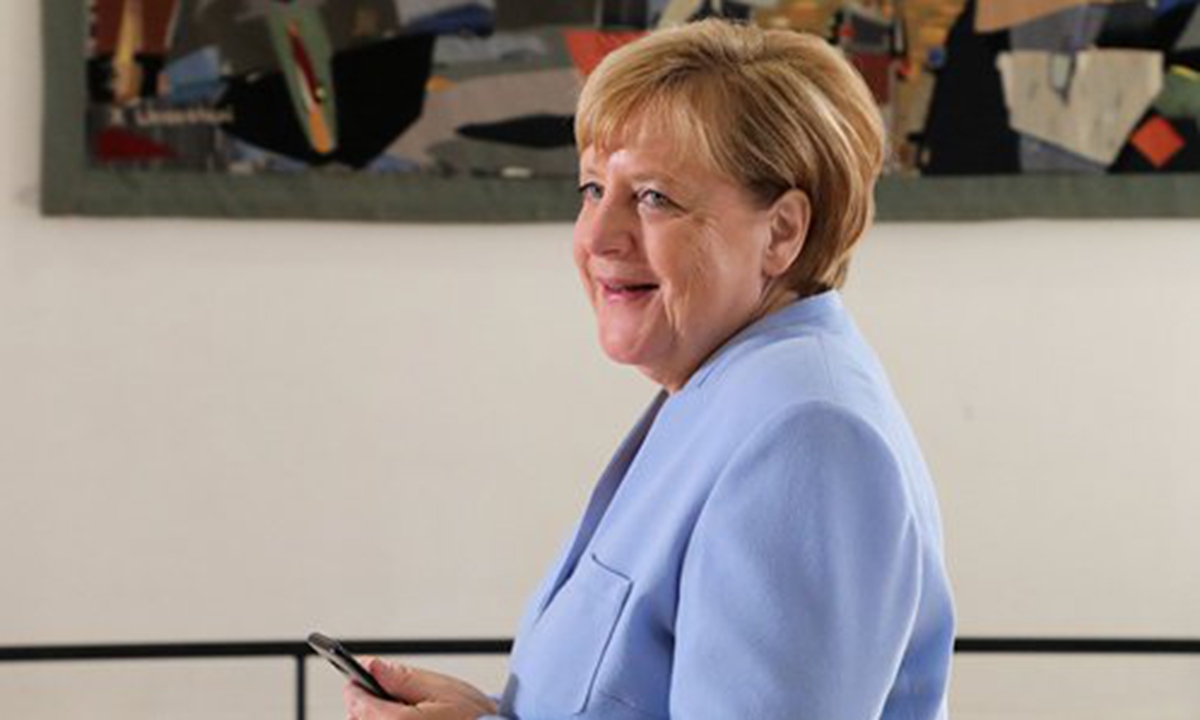Why Germany can confidently balance US and China relations
By Zheng Chunrong Source: Global Times Published: 2020/12/1 20:13:40

German Chancellor Angela Merkel Photo:VCG
The Berlin Pulse, a foreign policy publication put out by the Körber Foundation, discovered in a recent survey that 82 percent of respondents think that Germany should remain neutral in case of a Cold War between China and the US.
There are two reasons that can explain why the Germans feel this way. First of all, the historical memory of the division of Germany during the Cold War between the US and the Soviet Union has helped mould Germany's diplomatic choices. Secondly, staying neutral in the game of great powers is one way to achieve the geopolitical autonomy that Germany ultimately desires. Therefore, it is reasonable that the German people would exercise restraint when being pushed to take sides between China and the US in case of a new Cold War.
But what is the position of the German government in terms of its relations with the US and China now? For a long time, Germany has relied on the US in many aspects, especially for security. It also shares similar values with the US. But in recent years, Germany and Europe have started to feel that they should hold their own destiny more tightly in their own hands. The Trump-era US has severely jeopardized Europe-US and Germany-US relations.
Although the election of Joe Biden offers some slim hope, the brokefn trust will be difficult to repair. They will be ever more guarded with one another.
An article published in the daily German newspaper Der Tagesspiegel suggests that Germany and the EU must not blindly follow the US in a misguided struggle for global supremacy. It argues Germany must safeguard its interests in front of Beijing without becoming US' lapdog.
Not being a US lapdog means not blindly following the US. Some observers in Germany and Europe have realized that the Americans just see the Europeans as a tool to realize their own interests. Therefore, efforts to not simply walk lockstep with the US and maintain their own independence are a constructive option, and one we can expect to see exercised with greater frequency.
China supports Germany and Europe to pursue a strategically independent path. This means Germany should reduce its dependence on the US and make judgments based on its own interests. The guidelines for the Indo-Pacific region, which were released by the German government in September, call for diversifying Germany's foreign relations geographically with respect to policy. Hopefully, Germany can strike a balance between China and the US and does not put all its "eggs" into just one "basket."
China and Germany have differences in terms of political system and ideology, but Germany can interact with China in a flexible way. In the EU-China - a strategic outlook report released in March 2019, the EU defined China as a cooperation partner, negotiating partner, economic competitor, and systemic rival.
That being said, China is Germany's largest trading partner and partner in terms of coping with climate change. Germany's flexibility lies in its ability to carry out pragmatic cooperation with China in certain areas based on its own interests. As for divergences, the two can solve problems through dialogues and building up political trust.
Indeed, when German Chancellor Angela Merkel spoke to President Xi Jinping on November 24, she expressed her hopes to step up efforts with China to conclude negotiations on the EU-China investment treaty by the end of this year. If the treaty can be reached, it would be a very positive signal for the two countries' future cooperation. But meanwhile, strengthening cooperation may also increase Germany's defensive psychology against China.
What Germany needs to do is not to fall prey to ideological blindness like the US and instead seek pragmatic economic and trade cooperation efforts. Why complicate China-Germany relations over trivial matters?
Despite different European stances, Germany's leadership in the EU has made it possible to raise much of its own agenda to the bloc level. Berlin can even shape the common agenda of the EU as a responsible leader. Thus, Germany's relations with the US and China will be of great significance and have a big impact on the world as it manages a deft diplomatic balancing act.
The author is director of German Studies of Tongji University. opinion@globaltimes.com.cn
RELATED ARTICLES:
Posted in: VIEWPOINT,CHINA-EUROPE